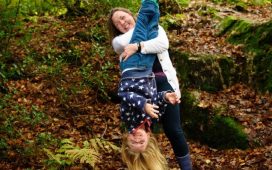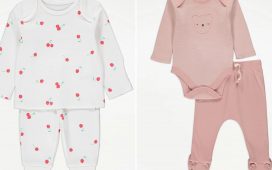It’s been curious to note what’s changed between 2014, when I last gave birth and 2020, when all signs point towards me doing so again. There are the small things, such as the quality of ultrasound scans, which this time seem so accurate, so detailed and school-photo-like compared to the eerie shadows we were presented with last time. Small things, like the prevalence of baby slings today – with Meghan Markle herself caught up in a “babywearing scandal” – and weaning advice, and the crushing weight of knowing too much.
And then there are the larger things, like my midwife’s detailed advice about monitoring the movement of the baby, the rhythm of its literal gut punches, and why to go to hospital when it starts drumming. There’s been a shift in origins of influence, in the places women get their information. When Kim Kardashian posted on Instagram about a morning sickness medication (in exchange for a reported $500,000), sales for the prescription pill jumped 21% to nearly $41.7m – today midwives only have so much power. Mothers continue, like me, to age – there’s a rumour that, at the hospital where I’m planning to give birth, there are more pregnant women over 50 than under 20.
It might be linked, too, to the way the language has evolved: some health professionals are careful to talk about “straightforward” births now, rather than “natural” ones, the latter having been weaponised as if whittled to a sharp point. In her new book, Full Surrogacy Now, the writer Sophie Lewis points out that “natural” childbirth, with its warm pools and clary sage aromatherapy, is “a regimen full of carefully stylised gestational labour hacks and artifices”. Nothing we do is purely natural.
After 50 years of maternal care shifting towards the “natural” – a reaction to the power imbalance of the medical establishment – this clarification in language (pushed forward by the 2015 investigation into the deaths of one mother and 11 babies in the maternity unit of a Cumbrian hospital, where midwives were found to be pursuing “normal” childbirth “at any cost”) is welcome, even if it has hardened unnecessary battle lines between some groups of women.
Women who should be reminded of the varied pressures and fears we all come to pregnancy with, and that “choice”, in labour and life, remains a sticky, mutable thing. But there is a new note of caution in discussions about birth – compared with the staunch purity of the advice I was given before, there are careful admissions that breastfeeding might not be for everyone, nor might all pregnant people be women.
However, for every 10 health professionals that read both the guidelines and the room, there appears to remain at least one still knee-deep in “nature”. Health secretary Matt Hancock is launching an investigation into allegations that women have been denied epidurals during childbirth, after six hospital trusts were found to have refused their requests; the Sunday Telegraph blamed the “cult of natural childbirth”. I am prone, like many soft-eyed narcissists, to leap from a news piece into my own bloodied history in order to make any story about me; birth-related news is particularly tempting. So reading this sent me straight back to the dawn of my daughter’s birth, and the hushed argument in the hospital room between midwife and doctor over whether there was time for the epidural I’d asked for. Spoiler, no, and now you must lie with me there, screaming for a second until we’re ready to continue.
I know, now, about constraints that limit access to epidurals (which the British Pregnancy Advice Service is clear “remains the most effective form of pain relief”), the most impactful being the seemingly arbitrary rule that an epidural can only be given within a 4cm window of dilation, a window easily missed, leaving people in unnecessary shock and agony. And I’ve learned more about the impact of staff shortages on epidural requests, a problem that stretches to safety issues in maternal care, a subject Hancock would do well to prioritise.
My personal fears about doing all this again are more precise and less existential than they were five years ago, and have already involved much admin. Yet, despite assumptions that this would be a temporary fascination for me, declining along with nappy use, my interest in the shifting priorities of the birth industry continues to grow as it becomes clear how many ideas about the ways we should be living are sealed into the meat of it.
The shape of birth continues to evolve and adapt, an ice sculpture that melts and refreezes as opposing tools chip away at its corners, but the fact of it remains – a baby is born into a room of politics and long deep breaths. And for all that has changed since I last gave birth, for all that I have learned, all this tired wisdom draped upon my flesh like a stained pashmina, there is more still that stays the same.
You have not heard the last from me on this. Apologies in advance.
Email Eva at e.wiseman@observer.co.uk or follow her on Twitter @EvaWiseman














